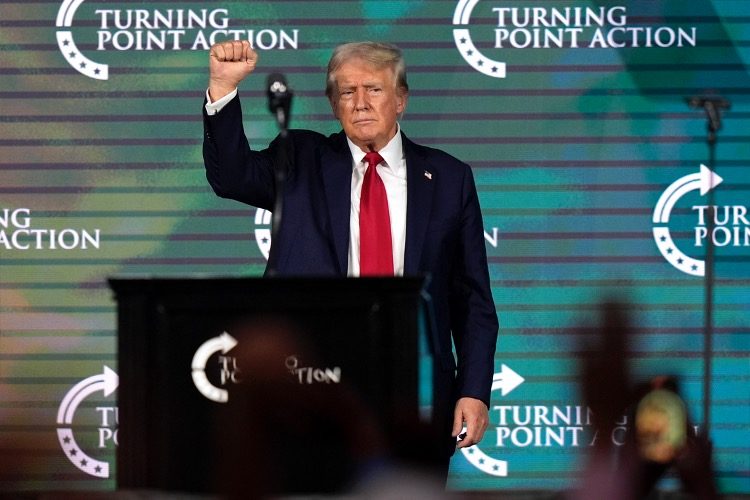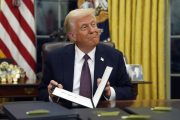
WEST PALM BEACH, FLA. — Former President Donald Trump spoke to a large group of Christians at Turning Point USA’s Believers’ Summit Friday evening at the West Palm Beach Convention Center. The president’s speech has been misquoted and mangled by mainstream media and social media alike, falsely claiming that Trump stated, “I’m not a Christian,” while drumming up a comment that people of faith need not ever vote again if he is reelected.
Upon taking the podium, Trump said, “I stand before you tonight, thanks to the power of prayer and the grace of almighty God. As I think you can see, I’ve recovered well and, in fact, just took off the last bandage off of my ear,” referring to his right ear, which sustained a bullet wound from the July 13 assassination attempt in Butler, Pennsylvania.
“I just took it off. I took it off for this group,” he said. “I don’t know why I did that for this group, but that’s it.”
Pivoting to the nearly 3,500-person audience hosted by Charlie Kirk’s advocacy group, Turning Point Action, Trump said, “I love you, Christians. I’m a Christian. I love you. Get out. You got to get out and vote. In four years, you don’t have to vote again. We’ll have it fixed so good you’re not going to have to vote.”
Many on social media immediately started sharing videos, garnering tens of millions of views, claiming that Trump said he was not a Christian. Upon viewing the clip, it is obvious that this is not true.
The New York Times then joined virtually all other mainstream-media outlets in publishing the headline, “Trump Tells Christians ‘You Won’t Have to Vote Anymore’ If He’s Elected.” The article went on to say that Trump’s offhand remark is “further evidence of an authoritarian, anti-democratic bent he has displayed throughout his political candidacy.”
Trump’s comments can be viewed in a different light after hearing speakers before him, including former Trump economic advisor Peter Navarro, Dr. Ben Carson, RNC Chair Michael Whatley, Christian apologist Frank Turek, Charlie Kirk, and others, encouraging people of faith to flood the polls this November, challenging religious demographics who historically never vote.
“Only half of Bible-believing, church-attending Christians are registered to vote,” explained Charlie Kirk before Trump took the stage. “Only half of them actually vote. In 2016, Donald Trump received 72 percent of the evangelical vote. In 2020, it was 68 percent, down four points. It [evangelical support] is not an automatic given.”
In context, Trump’s comments — delivered with a tone of humor that he sustained throughout his remarks — seemed to be appealing to Christian voters to break the cycle of apathy and get to the polls, even if it is just this once.
X (formerly Twitter) owner Elon Musk offered a defense for Trump’s remarks in a July 27 post: “Always important to watch the whole video. Trump is asking low propensity voters to go out and vote.” Musk, who officially endorsed Trump last month, continued, “Then he hopes to, but probably won’t succeed in, implementing voter ID laws nationwide. That would reduce, in his opinion, the amount of voter fraud to the point where low propensity voters don’t need to bother voting next time.”
In his remarks, Trump also doubled down on his commitment to Christians, promising that he would advocate for religious liberty, appoint more constitutionalist judges to the Supreme Court and lower courts, and touted his historic support for the State of Israel and the 2017 decision to recognize Jerusalem as Israel’s capital, moving the U.S. embassy there from Tel Aviv.
On abortion, the former president, whose Supreme Court appointees helped overturn the landmark pro-abortion case Roe v. Wade, was booed by nearly one-third of the crowd upon broaching the topic, stating that he, like Ronald Reagan, “strongly believes in the exceptions for the life of the mother, rape, and incest.”
“You have to go with your heart,” he responded to the crowd, “but you also have to win elections.”




